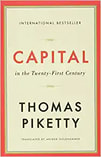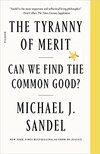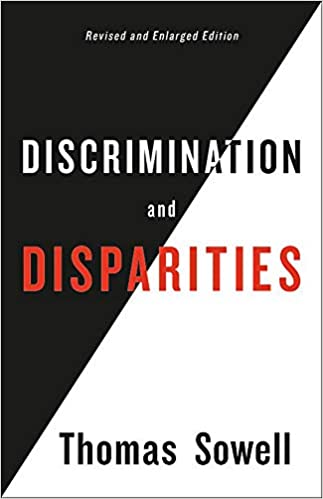The book distinguishes between what the author calls Discrimination I, an ability to discern differences in qualities of people, and Discrimination II, treating people negatively based on animosity to those of a particular sex or race. He agrees that Discrimination II is destructive to democratic society, but argues that Discrimination I is inevitable and actually beneficial. Beneficial discrimination would include the reality that employers hire those who they see as best meeting job qualifications, or that children who meet college entrance requirements are most likely to succeed. He justifies what he calls Discrimination IB, where an employer would hire based on the general characteristic of a racial or other demographic group to avoid having to examine the background of every applicant. He claims that this type of discrimination is cost effective because it eliminates needing to consider people whose backgrounds make them unlikely to succeed. Several people in our group called into question the distinction between Discrimination IB and Discrimination II, because both were based on stereotypes, were unfair to individuals and costly to individuals and society. Contrary to Sowell, these critics believed it was legitimate to legislate to prohibit Discrimination IB to prevent discrimination based on race, sex, ethnicity, etc. Sowell states that people tend to sort themselves by race and ethnic background. Thus he denies that segregation is major factor in housing discrimination. Even within communities of every background (Sowell is African-American), he claims that groups sort themselves based on identification with their subgroup, as did, for example, those of Irish from English from Italian populations in America at one point, and as did established blacks from poor recent arrivals in the North. He claims that this type of segregation is entirely natural, normal, and justified. He doesn’t account for the fact that whereas segregation among white ethnic groups usually disappear within a generation or two after immigration, segregation against blacks has persisted across generations. He points to the landmark 1954 Supreme Court Decision, Brown v. Board of Education that ordered integration of schools, as one that may have been well-intended, but ultimately did not meet its goal of equal educational opportunities. This is because, he claims, educational advancement for blacks did not result. Instead, he points to schools designed for particular groups, such as charter schools, as providing educational excellence. A member of our group pointed to contrary studies, for example ones showing significant gains in lifetime earnings for blacks who had attended integrated schools. He also devotes a chapter to the idea that words and statistics can be used to prove the point of those who already have made up their minds, and then use arguments and math to justify their previously determined positions. Words like “diversity” and “social injustice,” he claims, are used to justify government override of “millions of peoples mutually agreed transaction terms.” i.e. a society in which markets predominate free of government interference. Many in the group found this familiar conservative formulation unpersuasive. In the realm of taxes, he devotes a lot of energy to praising tax cuts and decrying tax raises, stating that national revenues actually have risen during times of tax cuts. He criticizes those who would denigrate “tax cuts for the rich,” another abuse of language. He cites examples of when tax cuts for the rich led to increased government revenue because the wealthy had less incentive to shelter their income, but does not cite many counterexamples where such tax cuts resulted in revenue decline, such as the 2017 tax cuts.  Most of us probably would agree with his idea that one of the key factors of success is motivation. Those who work hard to succeed are most likely to do so. But what about those from backgrounds where they were provided minimal stimulation or were neglected? Should we just say “tough luck” to those people? Sowell makes a claim that many people, and/or families, don’t stay in poverty for long, but his view is countered by, among others, Thomas Piketty, who wrote Capital in the Twenty-First Century, a book we have reviewed, that has reams of statistics showing how inequality increases in families over time. Michael Sandel’s 2020 book The Tyranny of Merit cites studies suggesting that social mobility in the US is significantly less than commonly thought, with only about 4–7 percent of those born in the bottom fifth if the income distribution making it to the top fifth. Most in the group did not believe that Sowell had successfully made the case against government intervention to help those who struggle in today’s economy, although it could be acknowledged that not all past interventions have been successful.  Perhaps this is the most relevant question we might ask ourselves: “What is government for in a democracy?” The answer would be different if we ask: “What is government for in an autocracy?” The promise of democracy that emerged around the world earlier in this century is largely unfulfilled, with many democratic-leaning states now leaning backwards. The reason is that the governments of those nations have been repurposed to serve the narrower needs of a portion of the population rather the population as a whole. Democracy is a Greek term for “government by the people,” and all governments serve some of the people. Governments that serve the needs of the largest amount of people are the most democratic. Those who would have their governments serve mainly themselves, or those like them, ultimately are compromising the lives and rights of everyone. Every attempt at democracy has been based on restoring rights to a segment of people who believed themselves overlooked, including those who founded the US, where we have gradually moved in the direction of greater human rights with perhaps three steps forward and two back. But once that vision is lost by those who serve themselves or their leaders rather than democratic principles, the slide toward autocracy begins. The purpose of government in democracy is to continually return us to that balance. Your comments and thoughts always are welcome. Also, don’t forget to look at our blog site renewingdemocracy.org. Please recommend this newsletter to people who you think might appreciate it. If you want to be added to the list to receive each new newsletter when posted, fill out our contact form and check the box just above the SUBMIT button. You may also use that form to be removed from our list.
Visit our Books page for information about purchasing The Future of Democracy, The Death of Democracy, Truth & Democracy, and Everyday Spirituality for Everyone. Click ↓ (#) Comments below to view comments/questions or add yours. Click Reply below an existing comment to respond.
0 Comments
Your comment will be posted after it is approved.
Leave a Reply. |
 5th edition now available 5th edition now available
Steve ZolnoSteve Zolno is the author of the book The Future of Democracy and several related titles. He graduated from Shimer College with a Bachelor’s Degree in Social Sciences and holds a Master’s in Educational Psychology from Sonoma State University. He is a Management and Educational Consultant in the San Francisco Bay Area and has been conducting seminars on democracy since 2006. Archives
July 2024
Categories |

 RSS Feed
RSS Feed